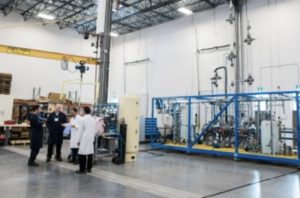Your Content Goes Here
If Canada is leading the way to a carbon negative future (which we believe it is), then it will need to consider the Carbon Capture, Utilization and Storage industry (CCUS).
Catriona Power from Foresight Cleantech Accelerator recently hosted a roundtable discussion and meeting at the carbon capture and conversion test facility in Richmond, BC as part of the BC Cleantech Cluster Strategy project to learn more about the current state of the industry in BC and to discuss the future of where this industry is heading and what can be done to accelerate the adoption and commercialization of this much-needed technology.

The discussion focused on the needs of the industry, and covered a wide range of topics.
Support the Industry: The Imperative of Good Policy
There was a discussion around the importance of policy in this growing (and emerging) industry. Government policy needs good guidance or it may have unintended effects. Policy needs to create fair incentives that are technology agnostic, but most importantly are seen as stable, which makes projects and companies financeable.
Policy in many cases will drive the investment in this industry, and since the financial/investor community is often risk-averse, this industry needs supportive, stable, long-term policies from government.
https://foresightcac.com/wp-content/uploads/2019/10/fs-post-carbon-capture-roundtable-2.jpg
Drive the Narrative: The Public Good Story
Carbon Capture, Conversion and Utilization is not only an investable, profitable business opportunity, it is also in the public good. (Experts estimate carbon capture and utilization (CCUS) will be an$800 billion/year industry by 2030 – and it will be necessary if Canada plans to fulfil our obligations under the Paris Climate agreement and cut GHGs by 30% below 2005 emission levels by 2030. )
This public-good combined with profitability is an important story that needs to be told, and a push forward in communications was seen as a significant need. We should be telling people that the costs are lower now, and telling success stories of the multiple companies emerging in the CCUS industry, (a ‘win/win narrative vs an ‘either/or’ type story about choosing emission reductions over economics).
The industry could also be rebranded (eg. Sequestration to Storage or Fuel Cells to Hydrogen, etc) and could sponsor more general educational and technical workshops. With increased visibility and a great ‘public good’ story, there may be a smoother path to funding.
https://foresightcac.com/wp-content/uploads/2019/10/fs-post-carbon-capture-roundtable-3.jpg
Talent/Markets/Capital: Driving the Whole Industry
In order for the industry to thrive and grow, (which it has to to meet Canada’s emission reduction targets), it needs access to talent, capital and markets.
For talent, there’s a need for diverse engineering and high tech talent (e.g. chemical, AI, big data), time to grow skillsets, and increased wages to attract global and Canadian talent.
For market development, a number of possibilities were discussed, including Bitumen Beyond Combustion (a big conversation in Alberta at the moment), flue gas in cement plants and at smaller emitters - compressor stations would be great for small CCUS as the electrical grid is not developed where some pipelines currently, or are planned, to operate (20MW electrical equivalent).
Capital is clearly an important topic for this emerging industry. Without sufficient capital, projects can not be executed and companies cannot validate technology and grow. There is a need for both large and small scale projects due to large project funding challenges. Policies and funding need to align to de-risk investment and shorten the time-to-market and investment cycle.
Funding projects that will be self-sustaining are important to showcase the industry and drive ongoing innovation and investment.
Where do we go from here? Sharing Knowledge, Working Together
There was a suggestion for more knowledge sharing in the industry as a whole, including a central IP resource and better connections between industry, researchers and investors. This could include a look at developing a complete rapid commercialization strategy for IP development, with cooperation happening from from research through to commercialization.
——-
Using the best practices of cluster-based economic development, the BC Cleantech Cluster Initiative is bringing together key stakeholders groups including small and medium sized enterprises (SMEs), associations, industry, investors and Federal and Provincial government to put in motion a sustainable model to help advance British Columbia’s thriving cleantech sector. For more information:https://foresightcac.com/cluster/



